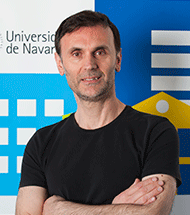Physicist Jorge Mira states at the University that not changing the time would be like wearing a coat in summer or bermudas in winter.
Member of the Commission for the reform of the official time in Spain, he is in favor of the time change to favor the synchronization of the population with the solar cycle.

"I wear shorts in summer and a coat in winter, keeping the schedule in winter in summer would be like wearing a coat in summer, and keeping the schedule in summer in winter would be like wearing shorts in winter". This was stated at the University of Navarra by Jorge Mira, Full Professor of the department of Applied Physics of the University of Santiago de Compostela. During his visit to the academic center, on the occasion of his participation in a seminar of the group 'Science, reason and faith', he spoke about issues very different from the time change, such as Lemaître and the Big Bang theory.
Professor Mira is one of the thirteen experts who are part of the commission of experts appointed by the Government of Spain to study the reform of the official time. They are in charge of the elaboration of the report of assessment of the provisions regulating the change schedule, as well as on the convenience of maintaining Central European Time in our country.
He states that the seasonal time change "is the most rational way to adapt to the changing light-dark conditions of the planet Earth, which has its axis of rotation deviated with respect to its orbit around the Sun". He points out that this deviation means that, in the northern strip of Spain, the difference between day and night is 6.45 hours at the summer solstice, that only three months later this difference does not exist, and that three months later it is already more than six hours in favor of the night.
He is sample supporter of the time change, despite the small "mismatch" that may occur on the days of the change in people, because it favors the tuning of the population with the solar cycle, not so much for energy savings. "The seasonal time change is a pact: we have that time jump twice a year, but in exchange we can enjoy an extra hour of sunlight in the afternoon for seven months. It's a trade-off of a minor inconvenience of a few days for a benefit of seven months. For me the balance is clear," he says.
"Removing one hour of daylight in the afternoon would reduce economic activity in tourist areas."Regarding the impact it would have on the overall economic activity of our country, Professor Mira assures that "the elimination of one hour of daylight in the afternoon would reduce economic activity, especially in tourist areas".
He also states that if the winter schedule (UTC+1) were maintained all year round, "in Barcelona it would be dawn before 6 am for four months of the year". And if the summer schedule (UTC+2) were maintained all year round, "in Galicia it would be dawning between 9h. and 10h. for four months of the year".
He also emphasizes the position to be adopted by other European countries in the face of a possible similar time change for all. He recalls that Portugal has already clearly stated that it does not want to keep the same schedule all year round, because it goes against scientific rationality: "Portugal is the best social experiment in the world on this topic, because it has tested over a century all possible time configurations, and by test-error has concluded that having winter schedule in winter and summer schedule in summer is the best. We should learn from them.
